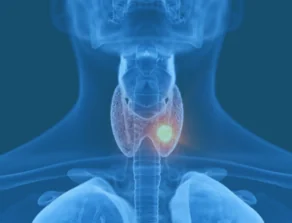Thyroid Cancer
About Thyroid Cancer
Thyroid cancer is the eleventh most common cancer in the U.S. and makes up nearly 3% of all new cancer diagnoses. It is the eighth most common cancer for women in the U.S. Fortunately, most thyroid cancers respond well to treatment, although a small percentage can be very aggressive and deadly.
Thyroid Cancer Key Facts
- An estimated, 44,020 new cases of thyroid cancer will be diagnosed in the U.S. in 2024, with 2,170 deaths expected to result from the diagnosis.
- About two-thirds of thyroid cancer is diagnosed when it is located only in the thyroid.
- The overall five-year survival rate for people with thyroid cancer is 98%.
- Medullary and anaplastic thyroid cancers (about 3 % of all cases) are more likely to spread or metastasize. At this stage, the survival rate is 43% and 4%, respectively.
- Women are about three times as likely as men to develop thyroid cancer.
- Caucasian Americans are 70% more likely to be diagnosed with the disease than African Americans, who have the lowest incidence rate of the disease.
- Although thyroid cancer occurs in all age groups, it is often diagnosed at a younger age. The average age when it is diagnosed is 51.
Source: American Cancer Society’s Cancer Facts & Figures 2024 and American Society of Clinical Oncology’s Cancer.Net

Most people with thyroid cancer have no known risk factors, so it is challenging to prevent most cases of this disease. However, there are ways to help reduce the risk of getting thyroid cancer:
- Avoid radiation exposure, especially in childhood – avoid radiation treatment (if possible)
- Genetic tests
- Look for gene mutations found in familiar medullary thyroid cancer (MTC)
- Once the disease is discovered in a family, the rest of the family members can be tested for the mutated gene
- Remove the thyroid gland in children who carry the abnormal gene
Resource: Can Thyroid Cancer Be Prevented? | American Cancer Society
Many patients, especially in the early stages of thyroid cancer, do not experience symptoms. However, as the cancer develops, symptoms can include the following:
- A lump in the neck, sometimes growing quickly
- Swelling in the neck
- Pain in the front of the neck, sometimes going up to the ears
- Hoarseness or other voice changes that do not go away
- Trouble swallowing
- Trouble breathing
- A constant cough that is not due to a cold
Source: American Cancer Society’s website 2024
- Sex – 3 times more often in women than men
- Age – can occur at any age, but the risk peaks earlier for women
- Hereditary conditions
- Medullary thyroid cancer
- Other thyroid cancers
- Familial adenomatous polyposis (FAP)
- Cowden disease
- Carney complex, type I
- Familial nonmedullary thyroid carcinoma
- Family or personal history
- Radiation
- Having had head or neck radiation treatments in childhood
- Imaging tests – x-rays and CT scans
- Radioactive fallout from nuclear weapons or power plant accidents
- Obesity
- Iodine in diet
- Low iodine leads to follicular thyroid
- High iodine leads to papillary thyroid
Resource: Thyroid Cancer Risk Factors | Risk Factors for Thyroid Cancer | American Cancer Society
NFCR-Supported Researchers Working on Thyroid Cancer
Harold F. Dvorak, M.D.
Beth Israel Deaconess Medical Center
Xiang-Lei Yang, Ph.D.
Scripps Research
Paul Schimmel, Ph.D.
Scripps Research

Thyroid Cancer Awareness Month is recognized in September.
Sign-up to Receive NFCR Emails
Be the first to learn about breakthroughs in cancer research and follow NFCR’s progress on making cures possible!














